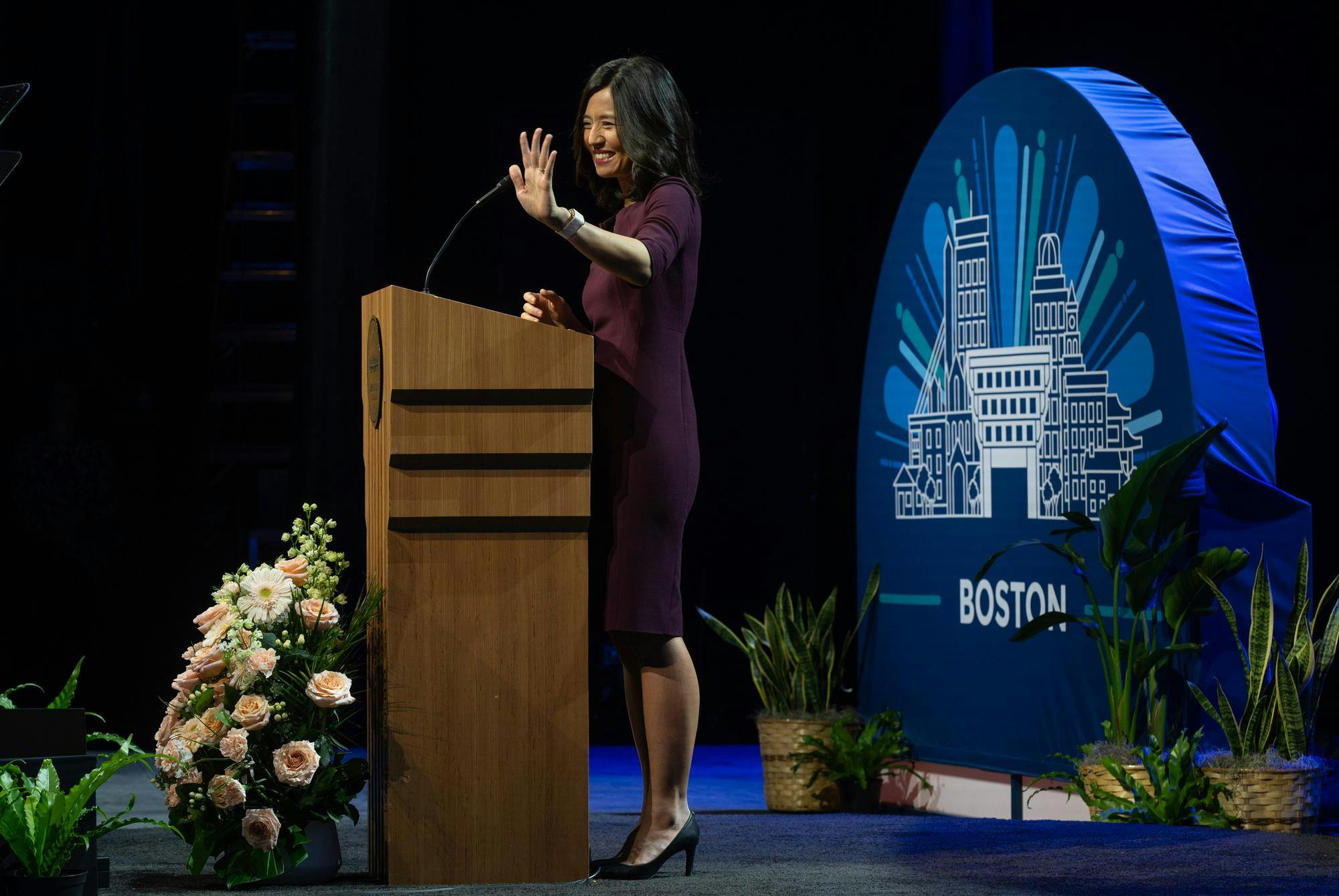Boston Mayor Michelle Wu delivered her second annual State of the City address at the MGM Music Hall on Jan. 9, introducing new plans for housing developments and access to public education.
Within moments of the mayor walking on stage, two protesters chanting and holding a Palestinian flag appeared at the venue’s front. Other attendees simultaneously dropped pamphlets and echoed chants of “ceasefire now,” while a large banner was unfurled from the third balcony with the words “Boston Complicit With Genocide” written across it. The statement is in protest of Israel’s war with Hamas, which has killed thousands in the Gaza Strip since the latter’s initial attack in October.
“This is our democracy at work,” Wu said, while officers ushered the protesters away. “We are a city for all voices.”
According to several local news outlets, 20 people were arrested and charged with disorderly conduct by the Boston Police Department outside of the event. When contacted by the Daily, BPD did not immediately provide an arrest report.
“The point of having this event is to celebrate our democracy and the things that we can accomplish when people come together and express all different points of view,” Wu said when addressing the detainments later in the night. “Every voice in our democracy is valued. And I’m really grateful to the staff here for making sure that we could see that, respect that, and also continue to have an event. … It’s a time in the world where there’s a lot of emotions, a lot of advocacy that’s needed right now on many different issues.”
A central topic Wu addressed in her speech was her administration’s focus on developing and increasing the availability of affordable housing.
“Home is the place where everything starts,” Wu said. “Last year, we permitted the highest ratio of affordable housing in over a decade, and approved nearly 7,400 housing units for future development.”
Wu emphasized efforts to help family homeowners create smaller, independent living units within their property by reducing the barriers to construct additional units. Upon approval of design, residents can apply for a 0% loan to assist in construction of additional dwelling units.
“Planning for a more affordable, equitable and resilient future will help us weather the challenges that cities everywhere are facing — emptier downtowns, unpredictable commutes and housing prices that are squeezing families out,” Wu said.
Wu also touted the city’s office-to-residential conversion program that has spurred eight proposals to turn buildings in downtown Boston into housing.
Speaking to the Daily during press Q&A, Wu also emphasized efforts to ensure university students don’t displace neighborhood residents in Boston.
“The goal is that every campus should have student housing there so that students aren’t just pushed out into the neighborhoods, and we want to work with the campuses to support that,” Wu said.
Building on her original campaign promise of improved public transportation, Wu proudly stated that, in collaboration with state partners, Boston gained a representative seat on the MBTA Board in August.
She also addressed efforts to bolster Boston’s greenery, from the city’s first-ever networked geothermal system, which will provide fossil fuel free energy to “hundreds of families” in the Franklin Field area.
“This year, we will introduce zero net carbon zoning to make Boston the greenest city in the country,” Wu said.
Turning to education, Wu pledged to make the Boston Public Schools “the best education on earth.” Wu did, however, acknowledge the remaining inequities present in the Boston Public Schools system, despite this year marking five decades since a federal order for desegregation.
“After decades of underfunding, we’re building and renovating schools to reflect our students’ aspirations: state-of-the-art science labs, performing arts spaces, locker rooms befitting the City of Champions,” Wu said. “Today, 10 major BPS capital projects are underway — as many as were built in the last 40 years combined.”
Wu showed pride in her administration’s handling of essential city functions. In the last year, the city has filled more than 7,000 potholes, opened newly renovated pools, added e-bikes to the Bluebikes system and opened eight new playgrounds and parks. The city has also extended hours for 21 branch libraries and installed more than 300 new speed bumps on city streets.
Wu closed her speech with a story of her Taiwanese immigrant mother bringing her to an art museum on a day with free admission. She followed by announcing that, beginning in February, all BPS students and their families will receive free admission at several local museums, including the Museum of Fine Arts.
“It is thanks to the people of Boston that tonight I can say: The state of our city is strong,” Wu said. “Not because the challenges that remain are simple or small. But because they’re big, and they matter and we are rising to meet them.”






